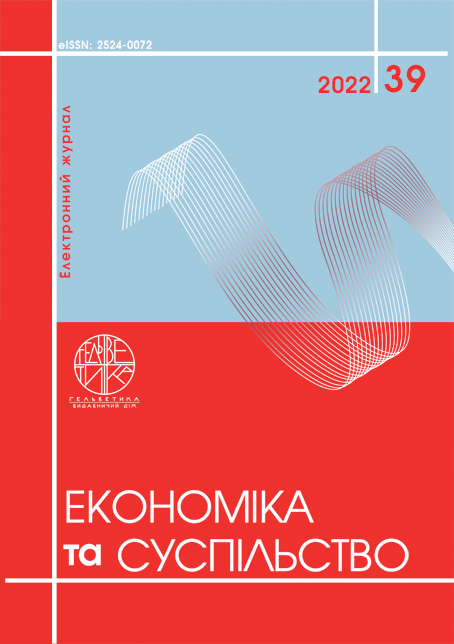INTERNATIONAL TRADE AS A FACTOR OF SUSTAINABLE DEVELOPMENT OF THE COUNTRY
Abstract
Expansion of international trade in recent decades, while bringing economic and social benefits around the world, has sometimes led to failures to overcome adverse social, environmental and even economic consequences. The purpose of study is to analyze the current problems of evaluation and prospects of international trade as a tool to enhance progress in achieving the SDG. International trade can bring prosperity, but also potentially create negative social and environmental consequences through direct effects (scale effects) and indirect effects (increased competition, which creates pressure reduce production costs). The economic and social benefits of trade have been described in detail by many economists and are significant. These include economic growth through exports, diversification and restructuring of the economy (vertical integration), industrialization, efficient allocation of resources, positive income effects, technological innovation and poverty reduction. Regarding drivers of social and environmental renewal, the author identified 5 factors based on the analysis, namely consumer demand, business-to-business demand for reputation management, civil society pressure (unions and environmental groups), government regulation and cooperation of many stakeholders to address sustainability issues. Social and environmental modernization can take place through the integration of social and environmental considerations into the production process or through vertical integration, ie the transition from, for example, small-scale contract farming to integrated farming, which implements sustainable development practices. GVC play an important role in international trade and are the mechanism by which the VSS disseminates standards. Each has different governance mechanisms and power relations that affect the extent to which sustainability issues, ie economic, environmental and social issues, can be addressed in the value chain. Depending on GVC management, social and environmental standards can be raised or lowered throughout the value chain.
References
Naegele H. (2020) Where does the Fair Trade money go? How much consumers pay extra for Fair Trade coffee and how this value is split along the value chain. World Development. 133.
OECD (2020) Trade policy implications of global value chains. URL: https://www.oecd.org/trade/topics/global-value-chains-and-trade/#:~:text=In%20reality%2C%20about%2070%25%20of,consumers%20 all%20over%20the%20world (дата звернення: 06.06.2022).
Ponte S. (2019) Business, Power and Sustainability in a World of Global Value Chains: A History of Power, Politics and Profit. Chicago: Zed Books Ltd.
Shahid A., Dogan E., Chen F. (2021) International trade and environmental performance in top ten-emitters countries: The role of eco-innovation and renewable energy consumption. Sustainable Development, Volume 29, Issue 2, pp. 378–387.
Starobin S. (2021) Credibility beyond compliance: uncertified smallholders in sustainable food systems. Ecological Economics. 180.
Rymarczyk J. (2021). The impact of industrial revolution 4.0 on international trade. Entrepreneurial Business and Economics Review. Issue 9, No 1, pp. 105–117.
UNCTAD (2016) Trading into Sustainable Development: Trade, Market Access, and the Sustainable Development Goals, Developing Countries in International Trade Studies (United Nations Publication ISSN 1817-1214. New York and Geneva).
UNCTAD (2018) The Least Developed Countries Report 2018: Entrepreneurship for Structural Transformation – Beyond Business as Usual (United Nations publication. Sales No. E.18.II.D.6. New York and Geneva).
UNCTAD (2019b) Trade Policies for Compating Inequality (United Nations Publication Sales No. E.19.II.D.21 Geneva).
UNCTAD (2020) Better Trade for Sustainable Development: The role of voluntary sustainability standards. URL: https://unctad.org/system/files/official-document/ditctab2021d2_en.pdf (дата звернення: 06.06.2022).
UNCTAD, OECD, WTO (2013) Implications of global value chains for trade, investment, development and jobs. URL: https://unctad.org/system/files/official-document/unctad_oecd_wto_2013d1_en.pdf (дата звернення: 06.06.2022).
UNFSS (2016) Meeting Sustainability Goals. Voluntary sustainability standards and the role of the government.. Geneva: United Nations Forum on Sustainability Standards. URL: https://unfss.files.wordpress.com/2016/09/final_unfss-report_28092016.pdf (дата звернення: 06.06.2022).
UNFSS (2018) Voluntary Sustainability Standards, Trade and Sustainable Development. Geneva: United Nations Forum on Sustainability Standards.
UNFSS (2020) Scaling up VSS through Sustainable Public Procurement and Trade Policy. Geneva: United Nations Forum on Sustainability Standards.
United Nations General Assembly, Transforming our world: the 2030 Agenda for Sustainable Development, 21 October 2015, A/RES/70/1. URL: https://www.un.org/ga/search/view_doc.asp?symbol=A/RES/70/1andLang=E (дата звернення: 06.06.2022).
Wenxuan T., Gu S., Chi C., Duan Y. (2022) Trade Law Needs to Be Better Incorporated into the UN Sustainable Development Goals. Proceedings of the 2021 International Conference on Social Development and Media Communication, pp. 521–527.


